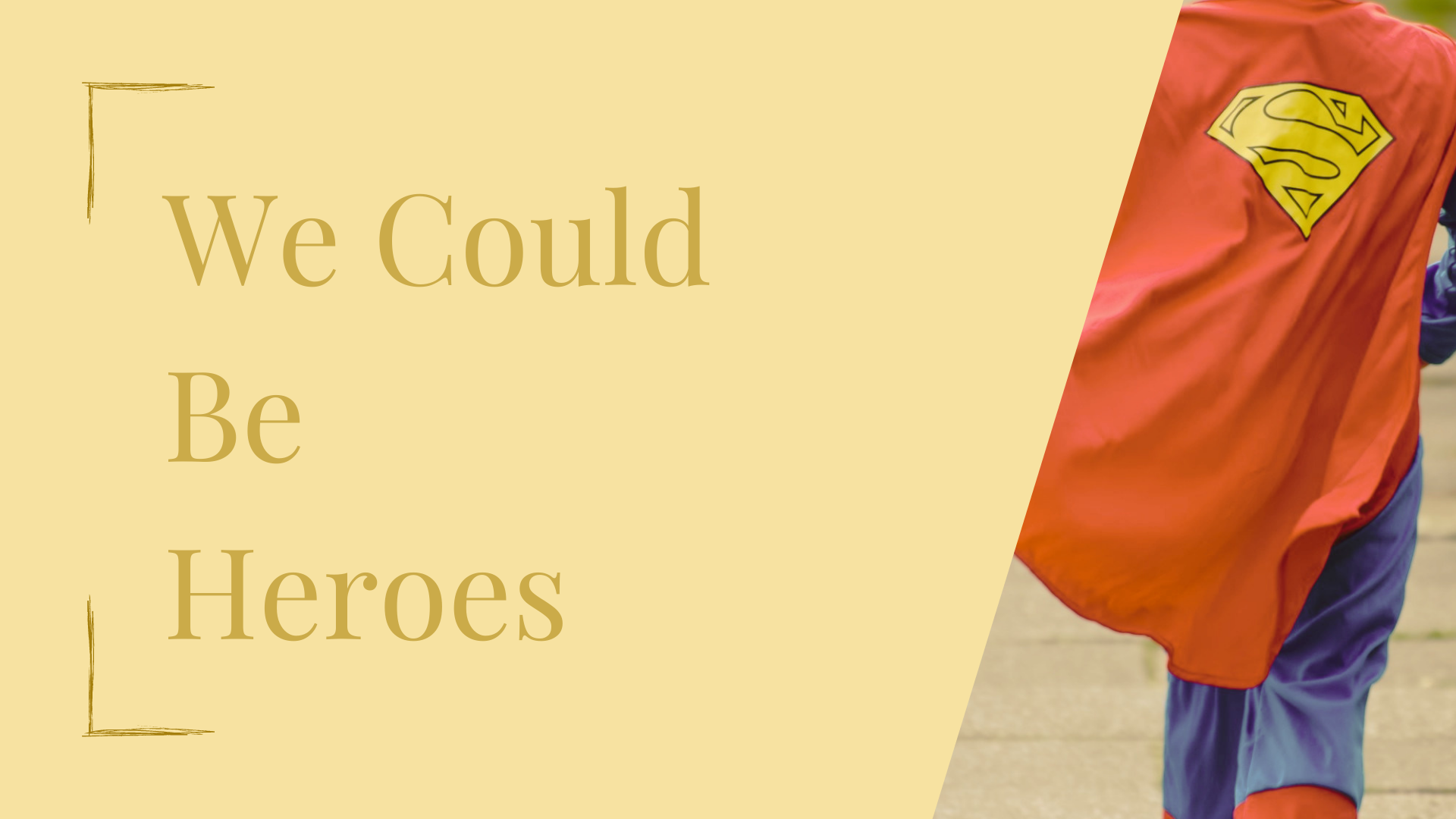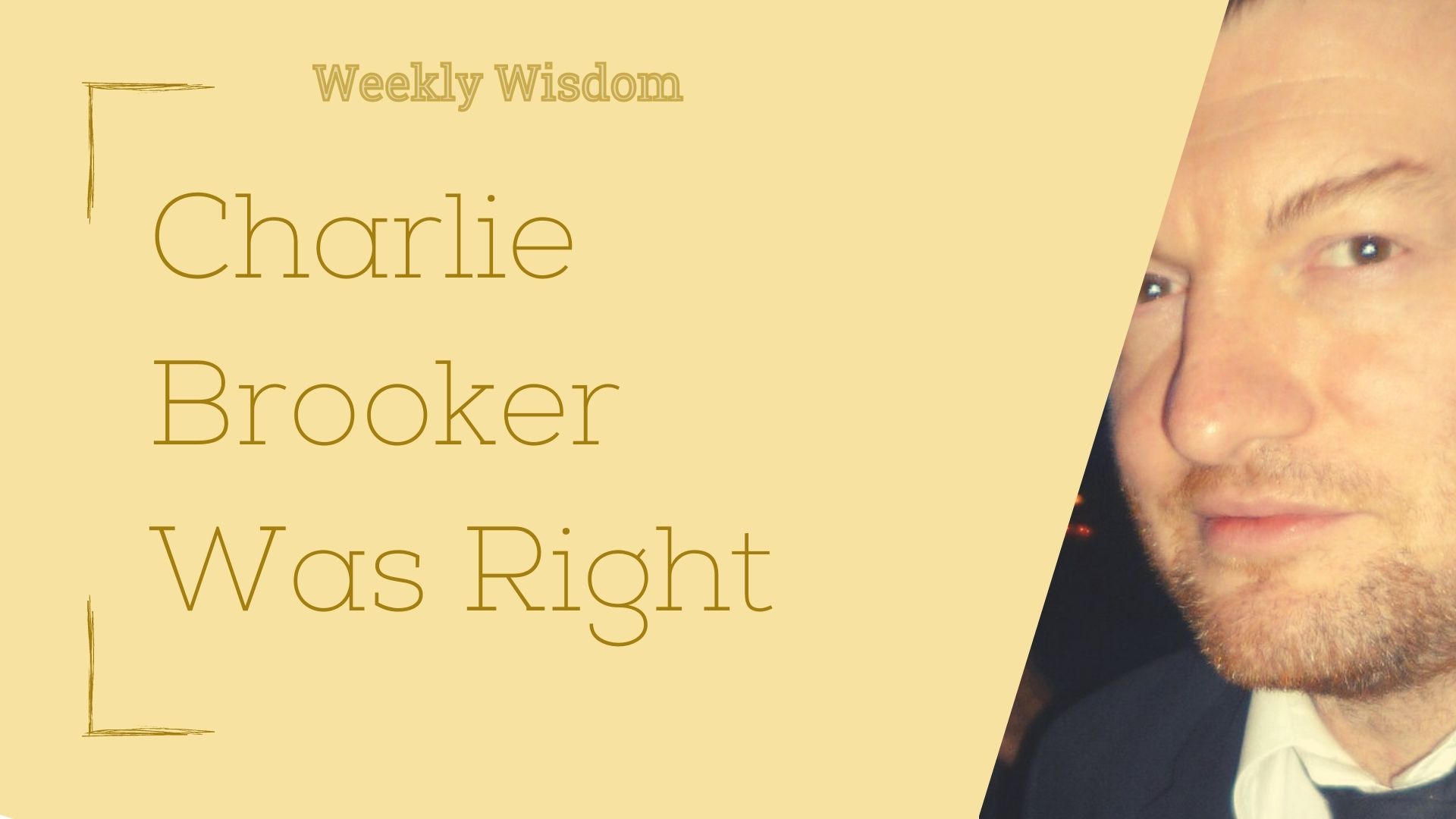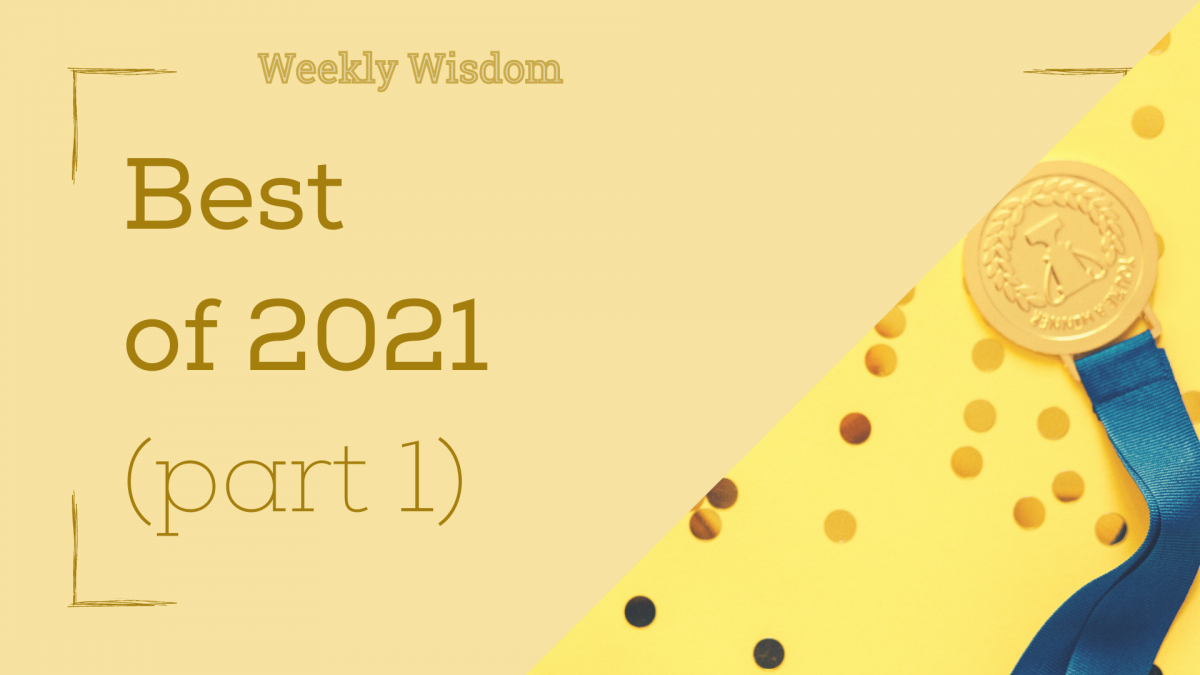Hello Subscribers, New and Old.
Welcome to Weekly Wisdom, your weekly dose of highlights, quotes and notes from my notebook. This issue is a year end summary. If you would like to check out the archive of regular posts, click here. Receive this in your inbox by subscribing now.
This week I’d like to recap the year. I sent 30 Newsletters since 23rd May, not including this one. Missing only one week where I had a flight. A really long flight. So I’d like to share with you some of my best notes and quotes(plus one of new one). This is just part 1. Part 2 will go out this Thursday.
Best Quote of the Year
The best quote I have is the one I only read this morning. It is a shame that I have to share this. It is incredibly sad. Lindsay Ellis is one of my favorite media critics. She elevated the Youtube video essay to a whole other level. She is quitting Youtube because of mob hate she has received over the past year. The context is irrelevant. The way she was treated was horrific. The post has been locked behind a paywall because it has lead to further attacks.
But all I know now is that being in the public eye at all is a losing game, and I regret all of it. I regret every time I’ve ever stood up for anyone – it always backfires. I regret every time I pushed back against something unjust – it was always just used to hurt me. I regret every time I ever stood up for myself – I never did it “correctly.” I regret every time I showed any vulnerability – just more ammunition to be used against me later. I regret every time I ever tried to play the game with peers and colleagues – they will drop you the second you aren’t popular on Twitter anymore. It’s all hollow and brittle, and if there is one thing I have learned this year it is how eminently expendable I am. The good, progressive cis, straight, wealthy white men keep on trucking and coming out on top because deep down, they know that the systems they profess to stand against ultimately exist to benefit them.
And to all the people telling me I need to grow a thicker skin or remove myself from the conversation altogether – you are right. I don’t have it in me to do the former, so I shall do the latter.
Hope your new year is better than this.
A lot has been said about this on Twitter. So I’d like to share some of my favourites from her videos;
- Her trilogy(in ‘2 parts’) on The Making of The Hobbit.
- The video on Protest music from the Bush Era.
- A take down of lazy criticisms of Disney princess movies.
- On Death of the Author.
There are many more.
Nothing is True
This excerpt is from Corey Doctorow’s book, How To Destroy Surveillance Capitalism. I will probably write a whole summary for it, but this quote by far the best summary of what is happening with fake news:
We have always had disagreements about what’s true, but today, we have a disagreement over how we know whether something is true. This is an epistemological crisis, not a crisis over belief. It’s a crisis over the credibility of our truth-seeking exercises, from scientific journals (in an era where the biggest journal publishers have been caught producing pay-to-play journals for junk science) to regulations (in an era where regulators are routinely cycling in and out of business) to education (in an era where universities are dependent on corporate donations to keep their lights on).
— Corey Doctorow, How To Destroy Surveillance Capitalism
Optimism vs Hope
Hope is not a ‘positive’ emotion. The worst action are justified on the basis of hope. Hopeful people are just as capable of evil as the fearful and angry. Optimism is not just hope.
Optimism should not be mistaken for hope. As political activist Barbara Ehrenreich states in her 2009 book Smile or Die: “Hope is an emotion, a yearning, the experience of which is not entirely within our control. Optimism is a cognitive stance, a conscious expectation, which presumably anyone can develop through practice.”
— Danah Abdulla, Against Performative Positivity
Instagram and Space
In this essay, writer Dayna Tortorici writes about the destruction that Instagram causes, in her self and society as a whole. This excerpt, examines how the social media platform has reshaped physical space it self.
Meanwhile, Instagram was leaving its trace on the physical world. People in search of ’grammable content were mobbing restaurants, public lands, and private neighborhoods in greater numbers, causing their stewards to think differently about design and crowd control. I read an article about rue Crémieux in Paris, where residents of pastel-painted houses were begging for a gate so tourists would stop taking photos in front of them. “It’s become hell,” the vice president of the street association told a local news website. “On weekends we get 200 people outside our windows. Our dinner table is right by the window and people are just outside taking pictures.”
…
New storefronts and restaurants were likewise optimized for the image. Considerations like comfort, accessibility, and acoustics were secondary to visual appeal. It was as if the landscape itself had dysmorphia, altering its physical appearance to fit an arbitrary standard that undermined its primary function.
— Dayna Tortorici, My Instagram
Cross-Promotion

The essence of the web, every morning in your inbox.Tens of thousands of smart people start their day with their personalized digest by Refind. Sign up for free and pick your favorite topics and thought leaders. https://refind.com/?utm_source=newsletter&utm_medium=barter&utm_campaign=FU-SmtfFzzhQJDgFEz5eiw
On Ambivalence
I am not a fan of dichotomies. History is not a narrative of good and evil. I may not be against you if I am not with you. The truth resists simplification, and dichotomies are the simplistic method of framing history.
But in 2020, it feels as though we live in a society that doesn’t believe people can be two things at the same time. It’s not a matter of ideological difference; it’s a matter of sloppy, dichotomous thinking. We want simplicity while we resist ambivalence.
— Polina Marinova Pompliano, The Profile
Acceptance is Key
As mentioned, I do not like dichotomies. The worst is Positive vs Negative. However, in describing psychological phenomenon, it is a great metaphor. Author Mark Manson uses this metaphor as an inherent paradox of seeking happiness.
The desire for more positive experience is itself a negative experience. And, paradoxically, the acceptance of one’s negative experience is itself a positive experience.
— Mark Manson, The Subtle Art of Not Giving a F*ck
Money vs Wealth
In this now famous essay on wealth, Investor Paul Graham explains in simple terms; what is wealth, and why it isn’t just money.
If you want to create wealth, it will help to understand what it is. Wealth is not the same thing as money.
Wealth is as old as human history. Far older, in fact; ants have wealth. Money is a comparatively recent invention. Wealth is the fundamental thing. Wealth is stuff we want: food, clothes, houses, cars, gadgets, travel to interesting places, and so on. You can have wealth without having money. If you had a magic machine that could on command make you a car or cook you dinner or do your laundry, or do anything else you wanted, you wouldn’t need money. Whereas if you were in the middle of Antarctica, where there is nothing to buy, it wouldn’t matter how much money you had.
—Paul Graham, How to Make Wealth
The Folly of Goals
Hunter S. Thompson, at the age of 22, had more wisdom than I had at 32. When his friend asked him about what to do with his life, he replied with this gem of a letter. This whole letter is beautiful, but this excerpt resonated with me a lot.
The answer— and, in a sense, the tragedy of life— is that we seek to understand the goal and not the man. We set up a goal which demands of us certain things: and we do these things. We adjust to the demands of a concept which CANNOT be valid. When you were young, let us say that you wanted to be a fireman. I feel reasonably safe in saying that you no longer want to be a fireman. Why? Because your perspective has changed. It’s not the fireman who has changed, but you. Every man is the sum total of his reactions to experience. As your experiences differ and multiply, you become a different man, and hence your perspective changes. This goes on and on. Every reaction is a learning process; every significant experience alters your perspective.
So it would seem foolish, would it not, to adjust our lives to the demands of a goal we see from a different angle every day? How could we ever hope to accomplish anything other than galloping neurosis?
— Hunter S. Thompson, Letter to Hume Logan
Righteous Rage, or Lack Thereof
Philosopher Agnes Callard shares her thoughts on Anger Management. These two paragraphs are perfect reflections of both sides of anger. The whole essay is highly recommended.
Among humans as well, at times it is only the angry who are in a position to apprehend the magnitude of some injustice. For they are the ones willing to sacrifice all their other concerns and interests so as to attend, with an almost divine focus, to some tear in the moral fabric. When I am really angry, it is not even clear to me that I can calm down—the eyes of the heart do not have eyelids—and the person making that request strikes me, to adapt a locution of Socrates’, as trying to banish me from my property, the truth. They are calling me “irrational,” but they seem not to see that there are reasons to be angry.
On the other hand, there are also reasons not to be. Aristotle says that anger is a desire for revenge, and he is right, though angry people will tend to call it by another name. Anger inclines people to apply exalted labels (“justice,” “accountability”) to acts of vengeance; it is a fog in which bad things look good, just because someone else did bad things first. Consider, for example, how people who would otherwise think it patently immoral to mock others’ physical appearance often feel free to do so when the target has been deemed unjust.
— Agnes Callard, Anger Management

The Burden of being a ‘Hero’
What are we doing when we label someone a ‘hero’? Why do we do it? After listening to this clip, I think we do it to absolving responsibility. It is from an episode of the Reveal news podcast. It follow a US Medical Resident during the height of the pandemic. And it is heartbreaking. While we celebrated these people for their work, we never did our part. I would recommend the whole episode.
Weaponized Mistake
The prospect of surgery is terrifying by itself. However, after reading The Checklist Manifesto, you will never want to get surgery. The book, by internationally lauded surgeon Atul Gawande, is about organization via checklists. But his inspiration to write the book came from all the mistakes he encountered in operating theater, despite highly experienced staff doing their best. Including this anecdote of stab wound victim in San Francisco. Apparently, the stabbing weapon determines surgical treatment.
There are a thousand ways that things can go wrong when you’ve got a patient with a stab wound. But everyone involved got almost every step right—the head-to-toe examination, the careful tracking of the patient’s blood pressure and pulse and rate of breathing, the monitoring of his consciousness, the fluids run in by IV, the call to the blood bank to have blood ready, the placement of a urinary catheter to make sure his urine was running clear, everything. Except no one remembered to ask the patient or the emergency medical technicians what the weapon was. “Your mind doesn’t think of a bayonet in San Francisco,” John could only say.
—Atul Gawande, The Checklist Manifesto
Tattle-punk
Apple, which has spent the past half-decade or so marketing its Privacy credentials, recently announced plans to scan customers data. Now the reason they give is to prevent child abuse. It is a commendable goal and I do not doubt their intentions. However, I also do know what they say about the Road to Hell.
Note: Apple has since dropped its plans.
While there are reasons to be skeptical of Apple’s claims, for the purposes of this article let’s assume that Apple’s client-side scanner does only what it says it does, how it says it does it, and it will never expand into other areas. Even if this is the case, Apple’s move now legitimizes client-side scanning. After all, if Apple can do it, a company that markets itself as caring about privacy, it must be OK from a privacy perspective for other companies to follow suit with their own client-side scanners.
…
As the scope of scan-worthy crimes expands, so do Internet of Snitches capabilities. Streaming media services would be motivated to search for DMCA violations on your devices. Your car could report when you parked illegally or disobeyed the speed limit (there are already proposals to mandate new cars scan you for impairment or for children left in the car). Your smart irrigation system could detect whenever you watered your lawn in violation of water conservation orders. Your home security system or smart doorbell could expand what data sharing it already does with law enforcement.
—Kyle Rankins, The Internet of Snitches

Charlie Brooker was Right
Charlie Brooker is an English TV writer and critic. Popular for his sci-fi anthology series Black Mirror, he also created and hosted the media criticism shows Screenwipe and Newswipe. A theme that is present in all his work is that people, as a whole, are vain sadists. He did not predict Instagram and Twitter witch hunts, but he came close. I would recommend all of his work.
This quote is not by Brooker. It is by a culprit publicly shamed during the peak of #MeToo. By his own admission he was responsible for a lot of the actions reported in the media. But what I am interested in is the punishment. The punishment has nothing to do with the culprit, but the public’s capacity for sadism. The crime is irrelevant, we just need an excuse to exact societal revenge. The victims are victimized more so in this process. Nobody wants their pain to be just a cudgel for the mob to live out its violent sadists.
I don’t engage with the shaming because it feels impenetrable, monolithic, all-consuming. It is an essentialist defining document that says my soul is forever bad and wrong and anyone who says otherwise has been tricked.
Thank you for joining me today. Part 2 will be live this Thursday. If you know some who might enjoy this, please forward this email to them. And if you are reading this on the web.
Mudassir Chapra

